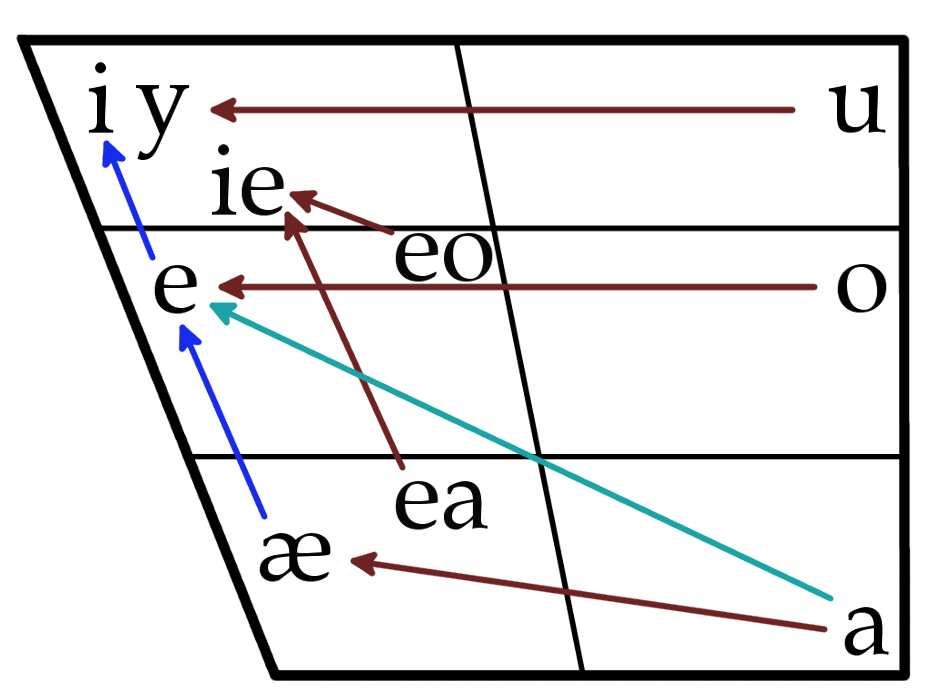
Ic for fram Fæder and com on middaneard.
Þa gesohton hie hine and him þæt wundor sægdon.
Þa þæt se ealdormon hierde, þa adrencte he hiene selfne.
His discipuli woldon eac þæt folc fedan: ac hi næfdon mid hwam.
Hwæt secge ge þæt ic sy?
[Ic] for {fram Fæder} and com {on middaneard}.
{Þa} gesohton [hie] <hine> and (him) <þæt wundor> sægdon.
Þa <þæt> [se ealdormon] hierde, {þa} adrencte [he] <hiene selfne>.
[His discipuli] woldon {eac} <þæt folc> fedan: ac [hi] næfdon {mid hwam}.
<Hwæt> secge [ge] þæt [ic] sy?



| m/f | singular | plural | singular | plural |
| Nom. | mann | menn | bōc | bēc |
| Acc. | mann | menn | bōc | bēc |
| Gen. | mannes | manna | bēc | bōca |
| Dat. | menn | mannum | bēc | bōcum |
In a clause with two verbs, the auxiliary is the finite verb, which governs an infinitive or past participle. In PDE, it is also the first verb in the verb phrase.
I have eaten.
We will see.
I hear that he was beaten.
Ich habe gegessen.
Wir werden sehen.
Ich habe gehört, dass er geschlagen wurde.
Express “modality”, i.e. degrees of (un)certainty, permission, or obligation. The tenses have developed to express further degrees of (un)certainty.
I can dance.
I could dance.
I will visit.
I would love to visit.
She may succeed.
She might succeed.
| MnE “present” | MnE “past” | OE origin | OE preterite |
| can | could | cunnan | cuðe |
| may | might | magan | mihte |
| must | —— | mōtan | mōste |
| shall | should | sculan | scolde |
| will | would | willan | wolde |
| cunnan |
know how to; be able, can; as independent verb: know, be familiar with |
| magan |
be able (cf. cunnan); be allowed (cf. mōtan) |
| mōtan | be allowed to, may |
| sculan |
obligation or necessity (must, ought); authoritative expectation (shall); reported claims (is supposed to) |
| willan |
want, wish less commonly pure futurity (will, shall) |
In OE, most modal auxiliaries are preterite-present verbs. This means they were once strong verbs, whose preterite forms came to be used for the present tense; new, weak preterite forms developed to express past action.
Hē mōt vs Hē fōr
Hē sceal vs Hē crēap
| cunnan |
ic can, þū canst, hē can, wē cunnon ic cūðe, þū cūðest, hē cūðe, wē cūðon |
| magan |
ic mæg, þū meaht, hē mæg, wē magon ic mihte, þū mihtest, hē mihte, wē mihton |
| mōtan |
ic mōt, þū mōst, hē mōt, wē mōton ic mōste, þū mōstest, hē mōste, wē mōston |
| sculan |
ic sceal, þū scealt, hē sceal, wē sculon ic sceolde, þū sceoldest, hē sceolde, wē sceoldon |
| willan |
ic wille, þū wilt, hē wile, wē willað ic wolde, þū woldest, hē wolde, wē woldon |
Of ǣlcum trēowe ðises orcerdes ðū mōst etan.
Hēo ne mihte þæt cild gehȳran.
Nān man hine ne cūðe gecnāwan.
Ǣlc cristen man sceal pater noster cunnan.
Wē willaþ ūs tō scype gangan.
Þū scealt grēot etan þīne līfdagas.
Ne mihtest ðū āne tīde wacian?
Lof sceolde hē drihtnes wyrcean.
Hwȳ ne meaht þū hit ongītan?
Ðū geherdest reccan þætte Iōb sceolde bīon se hēhsta god.
{Of ǣlcum trēowe ðises orcerdes} [ðū] mōst etan.
[Hēo] ne mihte <þæt cild> gehȳran.
[Nān man] <hine> ne cūðe gecnāwan.
[Ǣlc cristen man] sceal <pater noster> cunnan.
[Wē] willaþ <ūs> {tō scype} gangan.
[Þū] scealt <grēot> etan <þīne līfdagas>.
Ne mihtest [ðū] {āne tīde} wacian?
<Lof> sceolde [hē] <drihtnes> wyrcean.
{Hwȳ} ne meaht [þū] <hit> ongītan?
[Ðū] geherdest reccan þætte [Iōb] sceolde bīon [se hēhsta god].